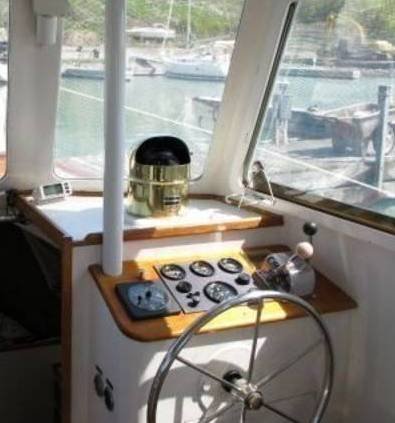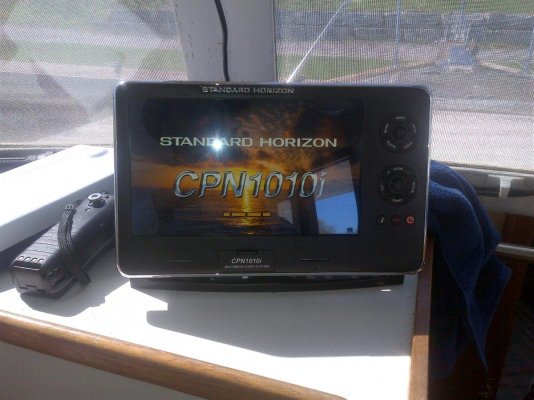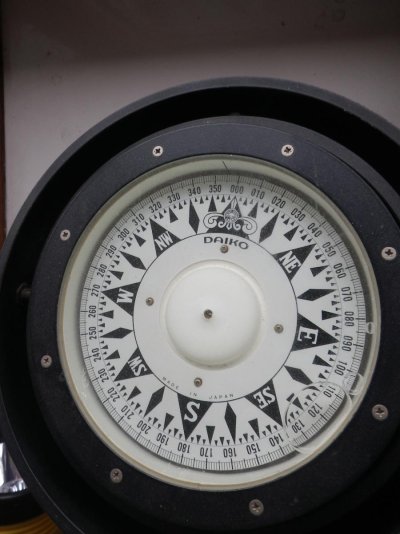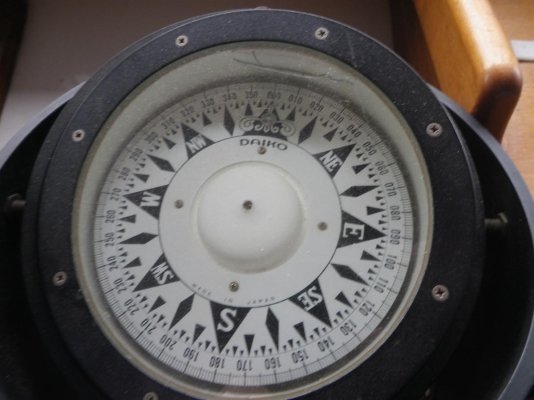You are using an out of date browser. It may not display this or other websites correctly.
You should upgrade or use an alternative browser.
You should upgrade or use an alternative browser.
Compasses - White versus Black
- Thread starter Mako
- Start date
The friendliest place on the web for anyone who enjoys boating.
If you have answers, please help by responding to the unanswered posts.
If you have answers, please help by responding to the unanswered posts.
LaBomba
Guru
- Joined
- Nov 18, 2012
- Messages
- 1,240
- Location
- Canada
- Vessel Name
- Looking Glass
- Vessel Make
- Carver 370 Voyager
This is a tough question as it may be dependant on the location in the boat or flybridge, the lighting or amount of windows, reflections etc. I have always had black compasses with no issues but really use the coloured Chartplotter a whole lot more.
Attachments
FF
Guru
- Joined
- Oct 12, 2007
- Messages
- 22,552
The easiest to read has a dished card , not a flat card.
The dished card carn be read from further away.
If its located in sunshine the white card will stay cooler with less chance of fluid loss due to expansion .
The dished card carn be read from further away.
If its located in sunshine the white card will stay cooler with less chance of fluid loss due to expansion .
Gulf Comanche
Guru
- Joined
- Dec 16, 2007
- Messages
- 1,045
- Location
- U.S.A.
- Vessel Name
- Old School
- Vessel Make
- 38' Trawler custom built by Hike Metal Products
Since the original fluid was likely alcohol based i am guessing it evaporates out the breather. i think most are equipped with some sort of breather that allows for the expansion and contraction of the liquid. maybe not an issue in LA but if you add much water i suppose it could freeze if it got cold enough.
There is usually a flexible membrane that allows expansion of the compass fluid, no breather vent. I think most are filled with some type of light oil, you can actually buy compass oil but I've used plain mineral oil. They start to leak when the membrane develops cracks.
Bob
Bob
Gulf Comanche
Guru
- Joined
- Dec 16, 2007
- Messages
- 1,045
- Location
- U.S.A.
- Vessel Name
- Old School
- Vessel Make
- 38' Trawler custom built by Hike Metal Products
No, no separation of oil & water. Never thought of the emergency booze storage area though. Trawler Forum members always on the cutting edge, yes?
No, no separation of oil & water. Never thought of the emergency booze storage area though. Trawler Forum members always on the cutting edge, yes?
Excellent idea! We can't even import a drop of booze here into Qatar. Does anyone know where I can buy a compass with a 4ft wide card that holds 55 gallons of "dampening fluid"???
My grand father (who was known for telling wild stories) used to tell me about when he was in the Navy (Korea era) that he was the supply guy for the ship he was on and ordered many, too many, gallons of compass fluid. his story was that they eventually got wise to him and the others drinking the fluid and eventually started sending them a denatured version, subsequently reducing the need for replace the leaking compasses.
Capt Kangeroo
Senior Member
Bob is right, most recreational compass's have a membrane that absorbs the expansion & contraction. Inevitably they fail. I have also seen them leak from the seal where they were factory filled. Glycerin or alcohol are the two dampening fluids I have heard being used. I have tried filling them using a red hot syringe and dripping molten plastic over the hole but it does not last.
As to colour, I'm sure a white compass is far less prone to rupturing in the sun.
As to colour, I'm sure a white compass is far less prone to rupturing in the sun.
Before we replaced the diaphragm in our upper helm compass, we would fill with compass oil and a month later air was back. I was able to get the parts on line. When I removed the old diaphragm you could see where it was cracked/aged (27 years old). Look on line. You can still get your Daiko compass serviced so you may be able to buy the parts and do it your self.
Similar threads
- Replies
- 5
- Views
- 628
- Replies
- 47
- Views
- 3K
- Replies
- 0
- Views
- 165




